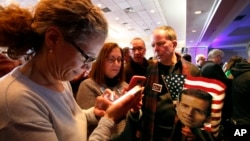It is difficult to avoid the news these days.
Some cable television stations report on the news 24 hours a day. The internet has a nearly endless supply of news websites. It also is easy to find all kinds of news stories on social media.
When combined, all of this information appears to make many Americans feel very tired or fatigued. You might say they suffer from ‘information overload.’
A recent survey found that nearly 70 percent of those questioned said they felt fatigued by the amount of news. But the remaining 30 percent said they like the amount of news they get. The findings come from the Pew Research Center in Washington, D.C.
Supporters of the country’s two main political parties reported feeling news fatigue. But Pew found Republican Party voters and Republican-leaning people were more likely to express feelings of fatigue. Seventy-seven percent said they were tired of the news. That compares to 61 percent among Democratic Party supporters and Democratic -leaning individuals.
Not surprisingly, Americans who reported the most news fatigue were the ones who read or watched the most news.
Pew also found that those who had a less than favorable opinion of the news media were more likely to report being fatigued.
Among those who said the national news media was doing “not too well” or not well at all at informing people, 80 percent reported feeling fatigued.
For those who said the media was doing “fairly well,” 69 percent reported fatigue. Among those who think the media was doing “very well,” only 48 percent reported fatigue.
Only 17 percent of those surveyed said national news agencies do very well at informing the public. Nearly 25 percent gave answers of "not too well” or "not well at all" when asked how well those agencies were doing in informing the public about the most important national stories.
Fifty-eight percent said the media do "fairly well."
One Twitter user said she fought news fatigue by directing her attention only to a few issues.
Another person on Twitter blamed her fatigue on fake news.
Levels of news fatigue were different among groups. Women were more likely to feel news fatigue than men. And Americans over the age of 65 were less likely than younger people to report fatigue, Pew researchers said.
I’m Alice Bryant.
Matt Hilburn reported this story for VOAnews.com. Alice Bryant adapted it for Learning English. George Grow was the editor.
_____________________________________________________________
Words in This Story
survey – n. an activity in which many people are asked a question or questions in order to find out what most people think about something
leaning – v. gerund. a verb used to say that someone supports one group or set of beliefs more than another
likely – adj. probably
fake – adj. meant to look real or genuine but not real or genuine





